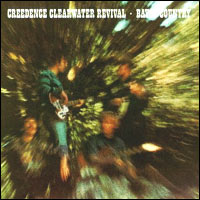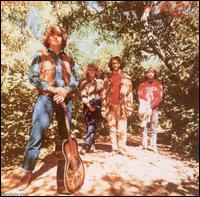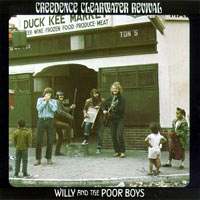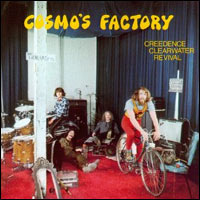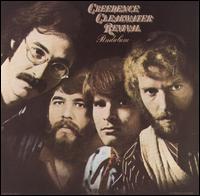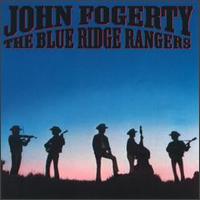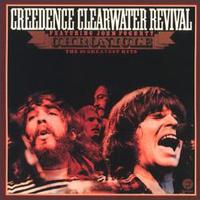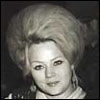Randy's Rodeo
music that rocks, rolls, swings, and twangs
| Artist Index | Song Index | Radio | Home |
|
Music Reviews Special Features Information Support Me |
Sock it to me, Santa!
Not that Creedence Clearwater Revival didn't look like hippies - they did - and they were embraced by the West Coast hippie culture almost as passionately as the group's musical antithesis, the Grateful Dead. The members of Creedence (including Fogerty's brother, Tom, plus Stu Cook and Doug Clifford) wore long hair and raggedy clothes and were capable of long, quasi-psychedelic jams. And, though their politics were more populist than revolutionary, they were sufficiently anti-establishment to earn them a place at the table. But while the Grateful Dead toyed with their music, noodling with melodies in a stoned stupor, Creedence Clearwater Revival embraced their's with clear-eyed passion. Creedence played with the aggressiveness of a garage band, driving their message home with economy and vigor.
That said, Creedence Clearwater Revival was an underwhelming debut, the work of a (very good) garage band finding it's creative legs. The most memorable cuts were covers, as the band smokes through Screamin' Jay Hawkins' "I Put A Spell On You" and jams through nearly nine minutes of Dale Hawkins' "Susie Q." John Fogerty's best number (the creepy "Walking On The Water") pales next to his later work, but a single edit of "Susie Q" brushed the Top 10, priming the pump for the band's sophomore effort. Bayou Country (1969) showed vast improvement, both in the strength of Fogerty's writing and in the focus and ferocity the band brought to their performances.
And, the best was yet to come. Something had taken hold of John Fogerty, and his creativity and ambition soon went into overdrive. Counting Bayou Country and "Proud Mary," Creedence charted three albums and seven singles in 1969 alone - most of them Top 10 - and almost as many in 1970. For a brief period, America's best band was also America's most popular band, and it seemed John Fogerty could do no wrong. In some circles, his prolific success backfired, as many observers labeled Creedence a "singles band" - as if having too many good songs on an album were even possible! In the words of writer Ed Ward, Creedence sought to subvert the Top 40 from within, and that made them unhip to rock-is-art snobs.
Willie & The Poor Boys spawned just one single, the double-sided hit "Down On The Corner" b/w "Fortunate Son." But it was marvelously varied masterpiece, from the rockabilly tall-tale "It Came Out Of The Sky" to a series of top-notch covers (especially "The Midnight Special"). The album that followed, Cosmos Factory (1970), represents Creedence Clearwater Revival's high-water mark, a huge hit (#1 for nine weeks) packed with marvelous songs, searing messages, and monstrously tight rock 'n' roll. With "Run Through The Jungle" and "Who'll Stop The Rain," Fogerty composed perhaps the perfect protest songs - ones that could be (and were) interpreted as condemnations of America's war in Vietnam but that make perfect sense if you've never heard of the place. As an antidote, there was the escapism of "Up Around The Bend" ("leave the sinking ship behind") and the goofy psychedelia of "Looking Out My Back Door" ("a statue wearing high heels") and another passel of well-chosen covers.
After the relative failure of Pendulum, Tom Fogerty split and the band took a short hiatus. When they returned, John Fogerty relinquished total control, allowing remaining bandmates Stu Cook and Doug Clifford an equal creative voice on what proved to be Creedence Clearwater Revival's final album, Mardi Gras (1972). Much of the record has a country feel - foreshadowing the direction Fogerty took with his initial solo career - but more than anything, it doesn't sound like a Creedence album. Only Fogerty's songs leave much of an impression, especially the snarling "Sweet Hitch-Hiker" and the strangely prescient "Someday Never Comes," a song about disappointment and lost ideals.
John Fogerty was warmly-received and sold respectably, and flush with that success a second record for Asylum (Hoodoo) was scheduled, then cancelled prior to release. Subsequently, John Fogerty disappeared for the better part of a decade. At least part of the time he was fighting Fantasy chief Saul Zaentz for control of Creedence's music - Fogerty lost, by the way - but one suspects he needed to replenish his creative juices. When Fogerty finally emerged from hibernation with Centerfield (1984), it was like he never left. The album zoomed to #1 on the strength of a Top 10 single, "Old Man Down The Road," that very nearly recaptured the swamp-pop glory of "Run Through The Jungle" - so much so that Zaentz sued Fogerty for plagiarizing his own song! Centerfield was a heartening (if inconsistent and mild-mannered) comeback, but the relative failure of Fogerty's next effort, the admittedly dismal Eye Of The Zombie (1986), drove him back into seclusion. Over ten years later, he bowed the widely-praised Blue Moon Swamp (1997) and the live Premonition (1998), wherein he reclaimed the songs of his celebrated youth.
Creedence Clearwater Revival's Chronicles: The 20 Greatest Hits (1976) was originally a two-LP set, though Fantasy reissued it on a single CD in 1983. Chronicles became one of the most popular CD's ever released and, in many ways, is also one of the best. Chronicles presents the very best songs by one of the very best American bands of the 1960's - hard to argue with that! But, unlike the rest of Creedence's catalog, Chronicles has never been remastered. Further, Chronicles Vol. 2, issued in 1986 to capitalize on the original's popularity, makes an imperfect companion. Mainly, all of the hits were loaded onto the first Chronicles - though with songs like "Born On The Bayou," Chronicles Vol. 2 is no slouch. But, a number of single edits were used on the Chronicles series, and "Susie Q" is split across the two volumes. Ideally, these two wonderful CD's should be reissued as a set - resequenced in chronological order employing full-length versions. But, I'm nitpicking. The point, of course, is the music, and Creedence created one of the most impressive catalogs in the annals of rock - most of it in barely two years. The things that made Creedence so great were twofold. First, John Fogerty stuck to the basics: simple, catchy songs played by a minimum of instruments - usually just two guitars, bass, and drums. Second, Fogerty understood that it was more important that his audience feel his music than admire or understand it. The moment he lost faith in that formula, he lost his muse. But before that happened, Fogerty and his band provided irrefutable proof that rock 'n' roll - the music of now, the music of the future - was grounded in the music of America's past - minstrel songs, country ballads, gospel shouts, and blues hollers. To Creedence Clearwater Revival, playing rock 'n' roll was a road to salvation, vindication, and transformation. But, above all, it was still a helluva way to spend a Saturday night. |
|
|||||||
Navigation Artist Index Song Index Randy's Radio Home Top Of Page Music Reviews Alternative Blues Books Christmas Classic Rock Country Jazz Lounge Special Features History Of Randy's Rodeo Sex Pistols Motown Records Halloween Valentine's Day Information About Me Feedback Links User's Guide Support Me Amazon iTunes Sheet Music Plus © 1999-2025 Randall Anthony, www.hipchristmas.com and www.randysrodeo.com |
|||||||||

